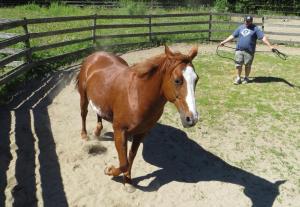At the Wild Hearts Therapeutic program, recovering war veterans bond with animals for well-being

Jennette Barnes for The Boston Globe
Iraq War veteran Rich Muldoon works with a horse named Kipper as part of the Wild Hearts Therapeutic Equestrian Program in West Bridgewater. The horses help people who suffer from post-traumatic stress, brain injury, and psychological illnesses.
WEST BRIDGEWATER — Humans can learn from what it takes to get a horse to trust us.
A horse is a prey animal whose ears are always alert to danger and whose instinct is to flee, even from humans. The staff at Wild Hearts Therapeutic Equestrian Program have a word for it: hypervigilance.
They see the same hypervigilance in people who have suffered trauma, particularly in some military personnel and veterans. In response, the organization started a program called Wild Hearts Horses for Heroes, which aims to help veterans and active-duty military personnel address problems that make it difficult to readjust to civilian life or return to duty, including post-traumatic stress disorder, other psychological issues, and traumatic brain injury.
On July 11 at a backyard farm in West Bridgewater, two Rhode Island veterans, Judy Feightner-Frederick and Rich Muldoon, will complete the program’s first veteran-specific class, Healing through Horsemanship.
Over the course of 10 weeks, the veterans learn to groom a horse, put on and remove a rope halter and lead, and guide the horse through a series of natural movements, such as walking, trotting, and turning.
Wild Hearts’ main program, equine-facilitated psychotherapy, is similar, but focuses less on horsemanship and more on specific goals set by a therapist. While the military program employs a horsemanship trainer, one-on-one therapy sessions are led by a clinical social worker, with Wild Hearts’ executive director, Julie Lovely, acting as the equine specialist.
Right now the program has only three clients because the therapist spends just one day a week at the farm, Lovely said.
Nicole Long, the social worker and equine-facilitated psychotherapist, watched during a recent class as Feightner-Frederick worked with Izzy, a gray Morab who Long said is accustomed to being the dominant horse.
“That’s why we’re so excited this is happening today,” she said. Despite Izzy’s inclinations to the contrary, he moved about the ring in response to Feightner-Frederick’s signals. His cooperation, she said, depends on the trusting relationship the handler has been able to build with him.
“Without that, none of this would happen,” she said.
Participants learn to respect the horse’s instincts, thereby reflecting on the congruence of feelings and actions, and they help the horse respond positively to an unfamiliar object.
Long said that although alertness can be positive and necessary for both horses and people, the program helps veterans to contain it, so it does not generate severe anxiety or the desire to isolate themselves from others.
Feightner-Frederick, 61, said trusting people has been difficult since she left the Army 20 years ago.
She joined the Women’s Army Corps in 1974, four years before women were integrated into regular Army units. Back then, how to do one’s makeup and hair were still part of the training, she recalls.
When she later became the first woman working in the California headquarters of her unit, the men did not accept her, she said.
She was stationed in various locations, both overseas and in the United States, and attained the rank of sergeant first class. She said she experienced ongoing sexual harassment, and her superiors, far from stopping it, would suggest it was more or less her fault. After that, she said, “You just don’t trust people like you used to.”
When she left the military in 1994, she had difficulty keeping a job. When she did work, she took care of dogs at a canine day care, a veterinarian’s office, and a pound.
“I didn’t want to be around humans,” she said.
According to Feightner-Frederick, her husband says their relationship has improved since she started learning horsemanship. In the past, she would talk loudly and gesticulate when she got excited, neither of which she can do around the horse. With a horse, you have to take baby steps and work as a team, she said…(CONTINUED)